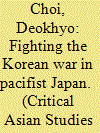| Srl | Item |
| 1 |
ID:
184148


|
|
|
|
|
| Summary/Abstract |
Korean–Japanese marriages were common during and after Japan’s imperial rule of Korea. Following the Japanese Empire’s demise, however, Japanese wives in Korean families faced new political dynamics and their ethnic belonging became an issue. This article introduces the experiences of some Japanese women who married leftist zainichi Korean men in the 1950s and 1960s, obtained through interviews and published memoirs. Their self-identification exclusively as members of the zainichi Korean community – or their experiences of “becoming Korean,” despite facing oppression in both the Korean community and Japanese society reflect the specific historical moment of Korean decolonization in post-imperial Japan. Their stories attest that Koreans’ efforts toward decolonization led to the establishment of an autonomous ethnic sphere and a new center of moral authority among zainichi Koreans. These women stood at the boundary between Korean and Japanese social spheres, which developed based on the malleability in women’s senses of ethnic and national belonging. Recovering their experiences can help us integrate post-imperial tensions and decolonization into the history of postwar Japanese society.
|
|
|
|
|
|
|
|
|
|
|
|
|
|
|
|
| 2 |
ID:
155760


|
|
|
|
|
| Summary/Abstract |
Where does “pacifist” Japan fit within the history of the Korean War? Was Japan simply the beneficiary of the wartime boom – a case best exemplified by Japanese Prime Minister Yoshida Shigeru’s characterization of the Korean War as “a gift of the gods”? When North Korean troops crossed the thirty-eighth parallel and launched a full-scale attack against South Korea, the U.S. occupation in Japan quickly transformed the pacifist nation into the indispensable rear base of United Nations military intervention in the Korean War. The Japanese Communist Party and leftist groups organized by zainichi Koreans (Korean residents in Japan) launched an antiwar movement to stop Japan from producing and sending arms to UN forces in Korea. The U.S. occupation responded with determined efforts to contain every antiwar voice emerging from the streets of the pacifist country. By examining the political dynamics of zainichi Korean and Japanese leftist solidarity and U.S. countermeasures, this article shows how the Korean War was fought in pacifist Japan. It also illuminates how the practice of Cold War containment was mutually linked on the ground between occupied Japan and South Korea.
|
|
|
|
|
|
|
|
|
|
|
|
|
|
|
|
| 3 |
ID:
171636


|
|
|
|
|
| Summary/Abstract |
Some scholars have argued that anti-Korean oppression is disappearing from Japanese society, and that race is irrelevant to the current condition of Zainichi Koreans, Japan’s disenfranchised postcolonial minority. In contrast to these views, this article builds on racial formation theory to retrace the historical development of racism in Japan, and to reveal its continuing impact on the lives of Zainichi Koreans. It remarks that Zainichi Koreans have reacted to oppression in various ways, forging new identities and resisting using the means available to them. But it also contends that the persistence of discriminations and inequalities, as well as the recent rise of ultranationalist groups like Zaitokukai, are proofs of the ongoing marginalization and persecution of Koreans in Japan.
|
|
|
|
|
|
|
|
|
|
|
|
|
|
|
|